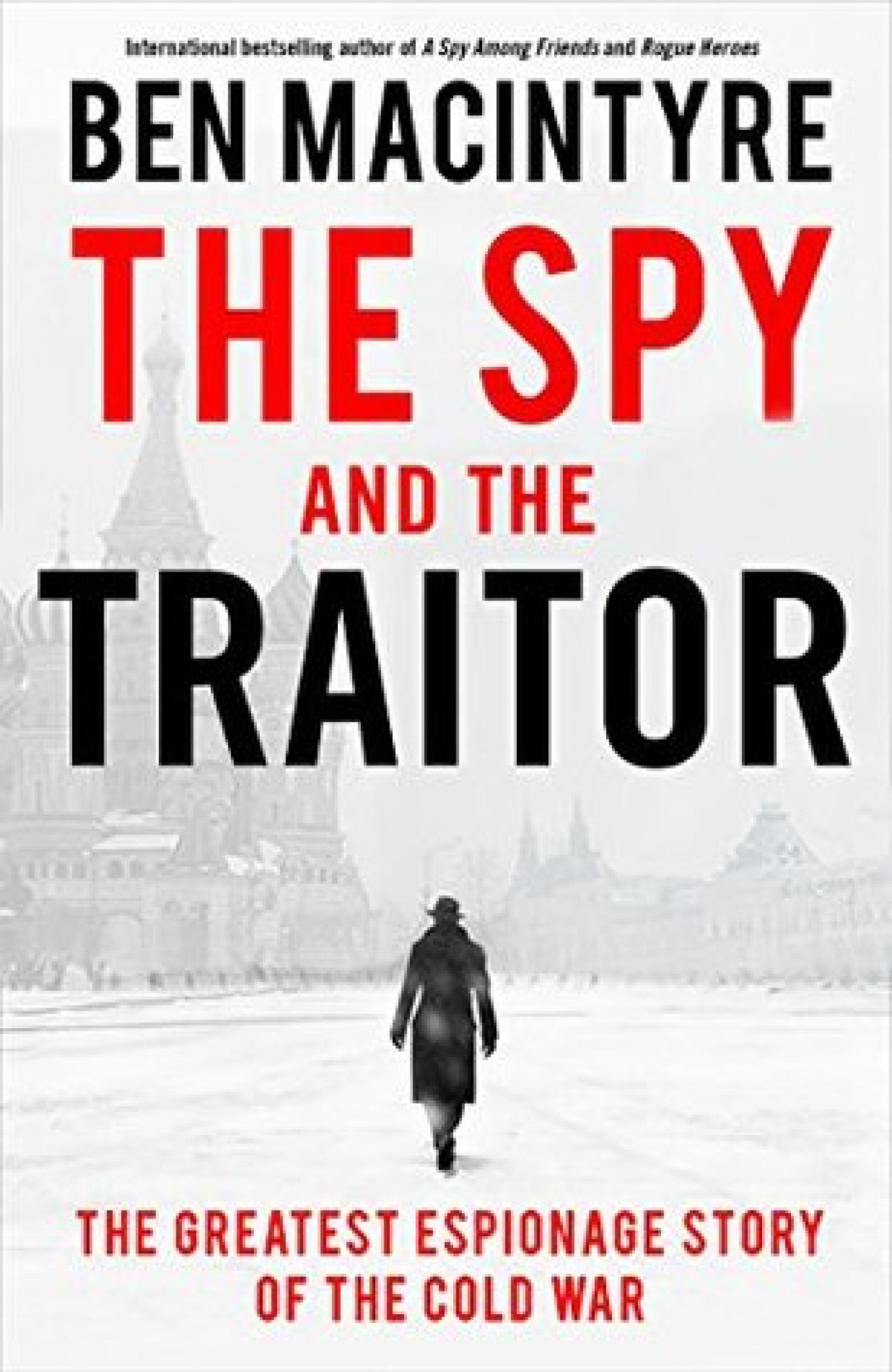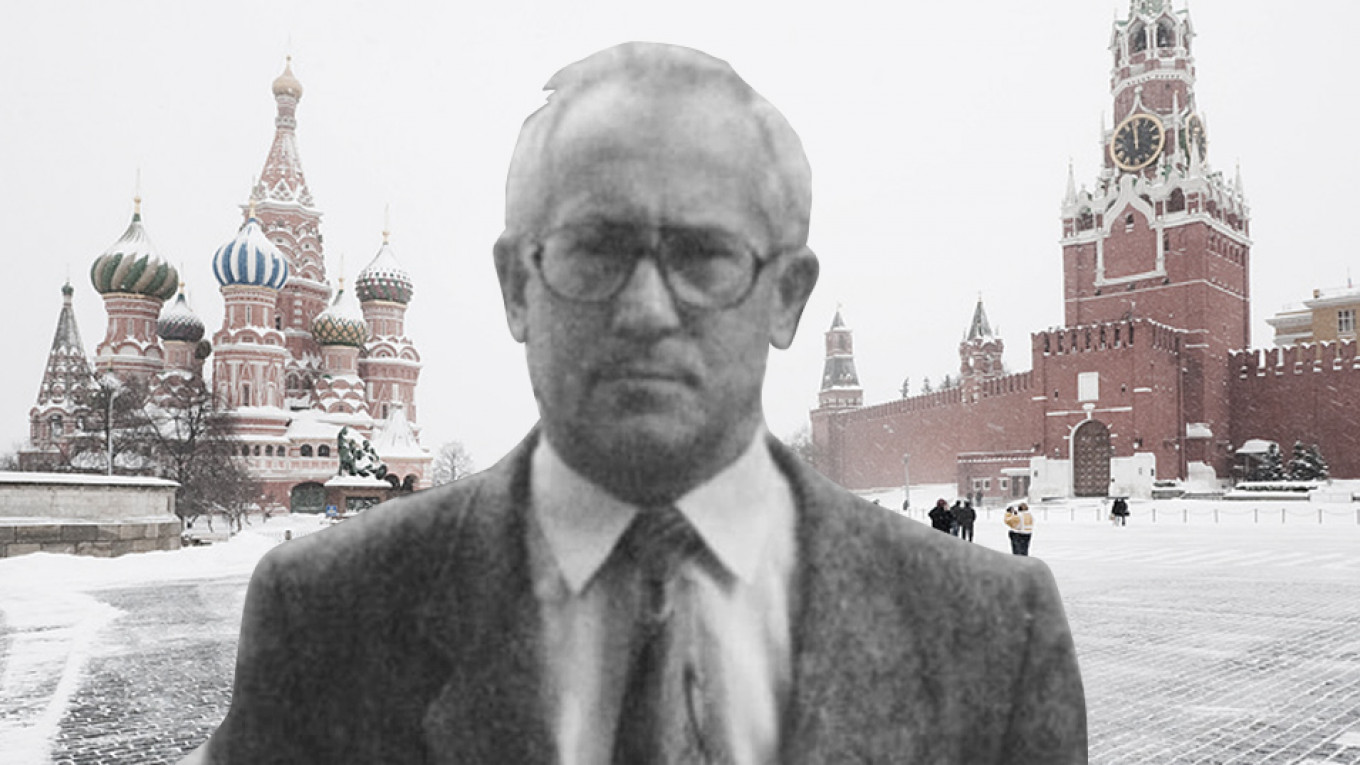“The Spy and the Traitor” by Ben Macintyre is meticulously researched history narrated by a natural storyteller. Macintyre, a columnist and associate editor of The Times, is the author of ten books about 20th century wars, espionage, spies and a variety of strange and colorful characters. His grasp of the arcane world — and lingo — of espionage is prodigious, here put to work to tell the tale of Oleg Gordievsky, a Soviet KGB officer who became a double agent working for MI6, and paradoxically helped strengthen relations between Margaret Thatcher and Mikhail Gorbachev, and indeed between the Soviet Union and the West. His “exfiltration” from the Soviet Union when it seemed that the game was up was an extraordinary act of inventive planning, careful execution and sheer good luck.
Macintyre begins his story in Moscow, where Oleg Gordievsky was born in a family headed by a career KGB officer and raised in an apartment building for families in the service. His older brother would also join the KGB. Gordievsky was attracted to the tradecraft, the excitement and intellectual challenge of a career in espionage. But he had also come of age during the Thaw, a time of more artistic and intellectual freedom in the 1950s and 1960s. It wasn't clear if a life in the KGB was for him.
In the end, he did join the KGB. He married a woman who worked for the KGB, too, although it was largely a marriage of convenience on both sides: Career advancement and foreign postings were only possible for married couples.
Gordievsky’s first posting was to Copenhagen, Denmark, where he was captivated by the freedom, vibrant cultural life, and technological advancements. He bought books by authors banned in the Soviet Union and even picked up some gay magazines out of curiosity. His open manner — and purchase of gay pornography — was noticed by the local intelligence agency. A few months later, at a party “in the home of a West German diplomat, he fell into conversation with a young Danish man, who was exceptionally friendly and evidently quite drunk. The Dane seemed to know a lot about classical music. He suggested they go on to a bar. Gordievsky politely declined, explaining that he needed to get home.”
The young man was an agent of the Danish intelligence service, which was trying to lure Gordievsky into a honey trap. They didn’t know why it failed — perhaps Gordievsky had spotted the trap? Or perhaps the young man wasn’t to his taste? The answer was simpler: Gordievsky wasn’t gay and didn’t know he’d had a pass made at him.
In Copenhagen, Gordievsky’s inner opposition to the Soviet Union hardened over time. Macintryre writes, “The outer world that propelled Oleg Gordievsky into the arms of MI6 was political and ideological: he had been profoundly influenced, and alienated, by the building of the Berlin Wall and the crushing of the Prague Spring; he had read enough Western literature, knew enough of his nation’s real history, and seen enough of democratic freedoms to know that the socialist nirvana reflected in communist propaganda was a monstrous lie. He had been brought up in a world of unquestioning obedience to a dogma. Once he had rejected that ideology, he became committed to attacking it with all the fervour of the convert, as deeply and irreversibly opposed to communism as his father, brother and contemporaries were committed to it. A creature of the system, he understood the ruthless cruelty of the KGB at first hand. Alongside political repression lay cultural philistinism: with the passionate fury of an aficionado, he hated ersatz Soviet music and the censorship of the Western classical canon. He demanded a different, better soundtrack to his life.”
The inner drivers to switch sides remained more obscure. But in any case, when he was eventually approached by an officer of MI6, he said yes, with three caveats: “First, I don’t want to damage any of my colleagues in the KGB station. Second, I don’t want to be secretly photographed or recorded. Third, no money. I want to work for the West out of ideological conviction, not for gain.”
Over the years, all those rules would be broken, but Gordievsky stayed true to his word.
And so began one of the most fruitful relationships in MI6 history. Gordievsky had a sharp intellect and extraordinary memory. He told his minders everything he knew about the organization of the KGB, its leadership, its objectives and activities. He provided information about foreigners in the pay or sway of the KGB — agents, confidential sources, contacts and “useful idiots”— which the British agents struggled to act on in such a way that they would not compromise or even hint at the source of their intelligence.
MI6 wanted to protect Gordievsky even in the Soviet Union. At his request, they developed an escape plan from Moscow that was complicated, dependent on perfect timing and luck. For years they had watchers followed a schedule for an alert, so that if Gordievsky signaled for help, there would always be someone there to see it.
After a stint in Moscow, where Gordievsky’s divorce and remarriage put him into temporary career purgatory, Gordievsky was posted to the Soviet Embassy in London. There MI6 helped him rise up by providing him with an endless supply of “chicken feed” — genuine but not seriously damaging information — and by slowly and methodically setting traps to catch and then deport his bosses until he was the chief KGB officer – the rezident — in the Embassy.
At this point, the story Macintyre tells seems almost unbelievable. Gordievsky provided advice to Margaret Thatcher and, eventually, American diplomats, on how best to behave to make a good impression on the Soviet leaders while, at the same time, as the London rezident he was sending tips and information, put together by MI6, to his Soviet bosses to help them negotiate with their Western counterparts. The pivotal 1984 visit of Gorbachev to the U.K. was successful largely because MI6 essentially stage-managed it.
But then Aldritch Ames, a disgruntled CIA officer, married a woman with expensive tastes, and Gordievsky’s tale almost came to a tragic end.
“The Spy and the Traitor” is an extraordinary rich history of international relations during the late Cold War period, intelligence-gathering agencies and their jealousies, joint efforts, and turf skirmishes — and the strange and captivating world of spy-craft. It is also a rollicking great read.

From a chapter entitled "Russian Roulette":
Most intelligence analysts who have studied the Gordievsky case agree that, at some point during his initial contact with the Russians, Ames revealed that there was a top-level mole inside the KGB working for British intelligence. He may not have been aware of Gordievsky’s name by this point, particularly if he was not personally conducting the investigation. But he surely knew that the investigation into the identity of an MI6 spy codenamed TICKLE was underway, and it is highly likely he passed this on during the wordless meeting in the basement of the Soviet embassy, in a warning message scribbled on a piece of paper. Even if he did not yet divulge a name, this would have been enough to unleash the hunting dogs of K Directorate [counter-intelligence].
When Ames emerged from his subterranean meeting, Chuvakhin [an arms control specialist at the Soviet embassy Ames had contacted] was waiting in the lobby. ‘Let’s go for lunch,’ he said.
The two men sat at a corner table in Joe and Mo’s restaurant, and began to talk, and drink. Uncertainty surrounds exactly what was said during that ‘long, boozy’ lunch. Ames later claimed, implausibly, that they spent the time discussing arms control. It is possible that, somewhere between the third and fourth martinis, Ames confirmed the existence of a British-run spy in the KGB. But he later admitted: ‘My memory is sort of a blur.’
At the end of the meal, Chuvakhin, who had drunk considerably less than Ames, handed him a plastic carrier bag filled with papers. ‘Here are some press releases I think you will find interesting,’ he said, just in case the FBI might be listening on a directional micro- phone. The men shook hands, and the Russian hastened back to the embassy. Despite the alcohol sloshing through his system, Ames climbed into his car, and headed homewards. On the George Washington Parkway, he parked in a scenic lay-by overlooking the Potomac and opened the shopping bag: at the bottom, under assorted embassy bumf was a wrapped rectangular parcel, the size of a small brick. He tore off a corner. Ames was ‘totally exhilarated’. Inside was a wad of 500 $100 bills.
While the American was counting his money, back at the Soviet embassy Chuvakhin briefed Cherkashin [chief of counter-intelligence in Washington], and the KGB officer composed another encrypted ‘burst’ cable, marked for the attention of [KGB head ] Chebrikov himself.
By the time Ames got home, one of the biggest manhunts in KGB history was underway.
From "The Spy and the Traitor: The Greatest Espionage Story of the Cold War," by Ben Macintyre, published by Penguin.
For more information about the book and author, see the Penguin site.
A Message from The Moscow Times:
Dear readers,
We are facing unprecedented challenges. Russia's Prosecutor General's Office has designated The Moscow Times as an "undesirable" organization, criminalizing our work and putting our staff at risk of prosecution. This follows our earlier unjust labeling as a "foreign agent."
These actions are direct attempts to silence independent journalism in Russia. The authorities claim our work "discredits the decisions of the Russian leadership." We see things differently: we strive to provide accurate, unbiased reporting on Russia.
We, the journalists of The Moscow Times, refuse to be silenced. But to continue our work, we need your help.
Your support, no matter how small, makes a world of difference. If you can, please support us monthly starting from just $2. It's quick to set up, and every contribution makes a significant impact.
By supporting The Moscow Times, you're defending open, independent journalism in the face of repression. Thank you for standing with us.
Remind me later.







